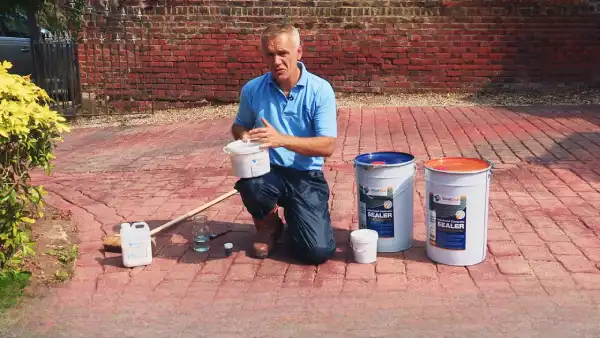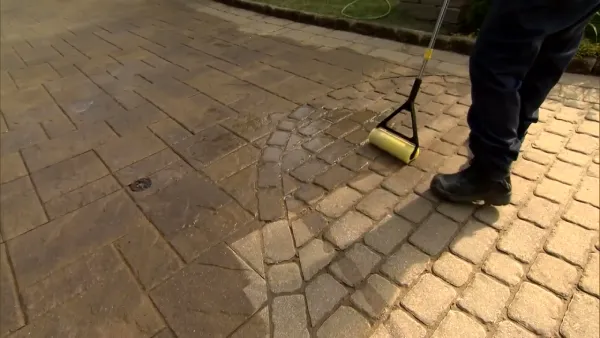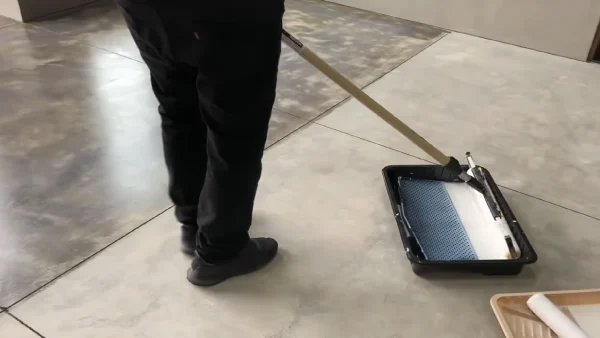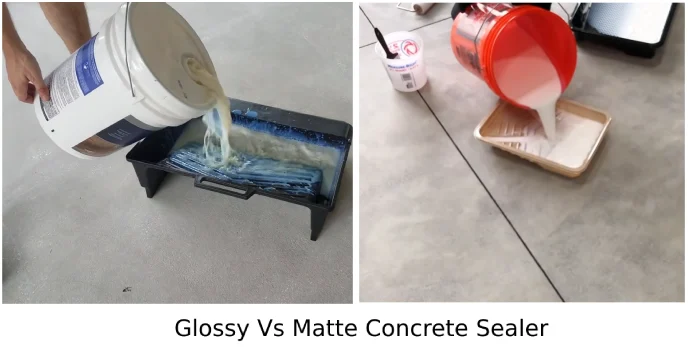Last Updated on February 6, 2023
Are you looking for a way to protect your concrete and enhance its look? If so, then you may want to consider using concrete sealers. Concrete sealer is applied as a thin layer of liquid that can be used to protect and enhance the appearance of concrete surfaces.
There are two main types of concrete sealers: glossy and matte. Glossy sealers provide protection from wear and tear as well as a high level of stain resistance. This type of sealer also enhances the color and texture of the surface, making it look more aesthetically pleasing.
Matte sealers provide slip-resistance on smooth surfaces, while still offering some degree of protection from stains and discoloration. They tend to require less maintenance over time than glossy sealers, but may not offer the same level of protection in harsh environments with heavy exposure to moisture or sunlight.
Types of Concrete Sealers: Glossy vs Matte
The two primary types of concrete sealers are glossy and matte finish. Glossy sealers give concrete surfaces a shiny, reflective appearance while matte sealers provide a more subtle sheen that does not reflect light as much.
Both types can come in a variety of colors ranging from clear coatings to more opaque tints that can enhance existing colors on the surface without changing its overall color significantly. In terms of durability, both types offer good protection from UV rays as well as wear caused by foot traffic or vehicles driving over the surface.
The main difference between them is their level of shine; glossy finishes will be more noticeable but may require additional maintenance due to fading or discoloration over time whereas matte finishes provide a less obvious protective layer but tend to last longer before needing any maintenance work done on them.
Advantages of Glossy Concrete Sealer
One advantage of using a glossy finish on concrete is that it enhances the color and texture of the surface by giving it an attractive shine that adds visual appeal while still protecting it from wear and tear due to foot traffic or vehicle use.
Additionally, glossy finishes are easy to clean since dirt or debris can easily be wiped away with a damp cloth instead of needing scrubbing with harsh chemicals like on some matte finishes.
Lastly, glossy finishes tend to offer higher levels of durability than their matte counterparts due to their ability to reflect light better which helps ward off damage caused by UV rays or water absorption over time.

Disadvantages of Glossy Concrete Sealer
While there are many advantages associated with using glossy finishes for sealing concrete surfaces, there are also some drawbacks that should be taken into consideration before making your final decision about which type to use for your project.
One disadvantage is that these types may show signs of fading or discoloration if they are exposed too often to moisture or sunlight while also not being very effective in harsher climates where intense rainstorms or winds could lead them wearing away quickly due inadequate protection offered by this type finish when compared with its matte counterparts.
Additionally, if you don’t want an overly shiny look for your project then this might not be an ideal choice for you since these types inherently offer more reflection than their counterparts do naturally without needing any additional treatments applied afterwards like waxing etc.
Advantages of Matte Concrete Sealer:
One of the biggest advantages of using a matte concrete sealer is its ability to create less noticeable wear and tear over time. This type of sealer creates a non-reflective surface that helps hide any scratches or scuffs on the concrete surface, making it look better for longer periods.
Additionally, matte concrete sealers are also better at resisting stain buildup and discoloration due to their ability to penetrate deeper into the concrete surface than glossy sealers. Finally, they also offer slip-resistance for smooth surfaces which can help prevent slips or falls due to slippery surfaces.
Disadvantages of Matte Concrete Sealer:
The downside to using a matte concrete sealer is that it requires more maintenance for cleaning as it doesn’t repel dirt or stains as well as glossy sealers do. Furthermore, matte sealers are not as durable against different elements such as UV rays, salt, oils, etc., thus requiring more frequent re-applications compared to glossy ones.
What is the Best One to Choose?
In general, choosing between a glossy or matte finish for your concrete depends on what you plan on using the space for and how much maintenance you want to put into it. If you plan on using an area primarily for outdoor activities such as entertaining or hosting events then a glossy finish would be ideal since it prevents slipping while being relatively low maintenance in terms of clean up.
However if you plan on using an area mainly indoors then a matte finish would be preferable because it looks better longer and won’t show wear or tear easily but still requires more effort when it comes to cleaning up spills or messes due to its lack of resistance against different elements such as UV rays or salt water exposure.
Ultimately, selecting between these two finishes boils down to personal preference; however taking the pros and cons into account will ensure that you choose the best option for your needs!
Definition of Concrete Sealer
A concrete sealer is a surface coating that is typically applied to concrete surfaces such as driveways, patios, pool decks, and other areas prone to wear or degradation over time.
It helps to protect against weathering, staining, fading, and other environmental factors as well as providing aesthetic improvement. Sealers can come in a variety of finishes such as glossy or matte, clear or tinted colors, and either water-based or solvent-based formulations.
How long does the concrete sealer last on concrete?
The longevity of a concrete sealer depends on several factors including the type of material used, environmental conditions such as temperature and humidity levels, and how often it is cleaned or maintained.
Generally speaking, most sealers can last anywhere from 3-10 years depending on these conditions. It’s important to research which type of sealer is best suited for your particular project in order to ensure that it provides maximum protection for the longest duration possible.
Is high gloss concrete sealer slippery?
High gloss concrete sealers can be slippery when wet depending on their formulation; however, many products come with slip-resistant additives to help reduce slipperiness when exposed to moisture or condensation.
Additionally, textured finishes such as sandstone or travertine provide added traction even when wet which can help reduce slipping hazards associated with glossy surfaces.

Can you put too much sealer on the concrete?

Yes, it is possible to apply too much concrete sealant which can cause an uneven finish and potential discoloration due to pooling or streaking in certain areas.
Therefore, it’s important to follow the manufacturer’s instructions regarding how much product should be applied per square foot in order to get optimal results without any damage caused by over-application.
Is it better to spray or roll concrete sealer?
It really depends on the surface area that needs sealing, as either method can work well depending on the size and shape of the area being sealed.
Spraying is usually faster but may not provide an even coverage while rolling tends to take longer but usually provides better overall coverage throughout the entire surface area being sealed. Ultimately, it comes down to personal preference as both methods are capable of producing satisfactory results when done properly.
What is the best coating for outdoor concrete?
The best coating for outdoor concrete will depend upon several factors including climate conditions (such as humidity levels), desired surface finish (glossy vs matte), and other environmental considerations (such as salt exposure).
Generally speaking though, acrylic-based coatings tend to be popular due their durability and ability to resist UV light fading compared other types of coatings available on the market today
Conclusion
Glossy and matte concrete sealers both offer unique benefits depending on your needs and preferences. Glossy sealers can enhance the color and texture of your surface while providing strong protection against wear, tear, chemicals, oil, salt and other elements.
However, they may not be as resistant to fading or discoloration over time in harsher environments with heavy exposure to moisture or sunlight. Matte sealers are often less noticeable when it comes to wear and tear over time but can require more maintenance for cleaning purposes than glossy counterparts due to their lower resistance to stain buildup and discoloration.
Ultimately, it’s important to consider your specific needs before deciding which type of concrete sealer is best for you!


